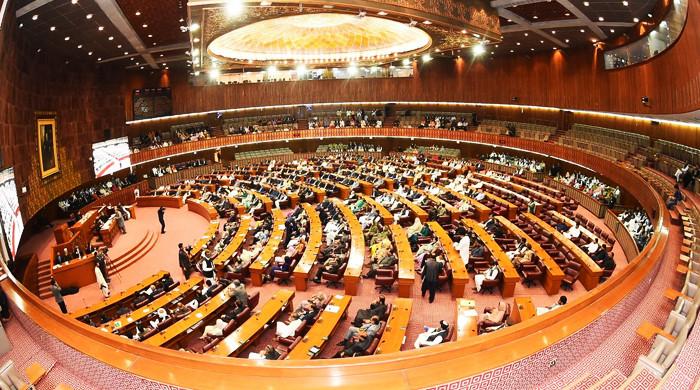ISLAMABAD: The National Assembly’s Wednesday session is underway with “important” decisions expected to be made as the government and the Supreme Court remain at loggerheads over the elections in Punjab and Khyber Pakhtunkhwa.
Sources told The News’ Saleh Zafar that the government is set to move a motion seeking to summon “three people” to the NA’s Privileges Committee for repeated contempt of parliament.
In a meeting of the ruling allies earlier today, Prime Minister Shehbaz Sharif said that a parliamentary committee would discuss the terms of talks between the ruling alliance and the Pakistan Tehreek-e-Insaf (PTI) regarding holding elections across the country on the same day.
He said the door for negotiations should not be closed. “We can decide what the format of the talks will be. The parliamentary committee can create room for this.”
The meeting came a day before a hearing of the Supreme Court on petitions requesting single-day elections to the national and provincial assemblies.
In the previous hearing, the apex court had directed the government and opposition parties to reach a consensus on the date for holding elections.
‘Anarchy’
In his address, Finance Minister Ishaq Dar came down hard on PTI Chairman Imran Khan and said the two assemblies were dissolved to spread “anarchy” in the country.
He said that the Election Commission of Pakistan’s request for the release of funds was sent to the finance ministry, but his ministry cannot allow the issuance of funds without the following “procedures”.
The minister added that in line with the law, the government brought the request before the cabinet and the parliament — both of whom rejected the proposal.
Dar said that the parliament accepts the 4-3 decision of the Supreme Court and noted that even the State Bank of Pakistan cannot release the funds — despite the top court’s order.
He said that in the Punjab Assembly case, Article 63-A of the Constitution was re-written and the “world is surprised over the new interpretation” of the article.
“What was the sin of the 25 members whose vote was not counted?” he asked, claiming that the decision was made to spread anarchy in the nation.
Dar then slammed the “elements” responsible for derailing Pakistan’s economy and said the country was standing at a “critical juncture”.
The finance minister asked what would happen if the elections are held after three to four months. “What will happen if the elections happen in the country in October?”
The minister said the government was being asked to do an “illegal” thing and he would never advise the cabinet to do so. He added that the law dictates that elections should be held simultaneously.
“We cannot go against the Constitution just on court orders,” he said, asking the parliament’s members to suggest what the government should do till tomorrow.
‘Parliament’s prerogative’
In his speech on the floor of the National Assembly, Law Minister Azam Nazeer Tarar said the lower house of the parliament has already passed resolutions for not providing funds to the Election Commission of Pakistan for polls.
“When the matter was taken up before the cabinet, the house had already issued its decision,” the law minister said, stressing that it is the parliament’s prerogative on the issuance of funds.
The minister added that the parliament had directed the federal government not to follow up on the Supreme Court’s “minority” decision on the elections.
“Releasing funds from the Federal Consolidated Fund is the parliament’s prerogative,” the law minister added.
The minister said a person dissolved the assemblies to satisfy his “ego”. He added that given the current circumstances, the parliament has the power to either ratify or review its earlier decisions.
‘Contempt of parliament’
Jamiat Ulema-e-Islam-Fazl (JUI-F) MNA Shahida Akhtar Ali, while speaking on the floor of the NA, asked how could the parliament allow the release of Rs21 billion funds to the ECP.
“The [SC] is imposing the decision on us. The institutions who are facilitating this person [Khan] should understand that he will come back to bite them,” she said.
She stressed the need to hold elections simultaneously and noted that the parliament would not be undermined by any institution’s orders.
In his address, Pakistan Peoples Party (PPP) MNA Agha Rafiullah — without naming anyone — asked whether there was any doubt that these “people are leaning towards others”.
“A salaried government employee has committed contempt of parliament,” he said, hitting out at the top court.
The PPP leader also asked the prime minister to order a forensic test of the recent audio leaks — including those of Chief Justice Umar Ata Bandial’s mother-in-law and ex-CJP Saqib Nisar.
“We should file a reference against such people in the Supreme Judicial Council,” he said.


 Entertainment2 days ago
Entertainment2 days ago
 Latest News2 days ago
Latest News2 days ago
 Latest News2 days ago
Latest News2 days ago
 Latest News2 days ago
Latest News2 days ago
 Latest News2 days ago
Latest News2 days ago
 Entertainment2 days ago
Entertainment2 days ago
 Latest News2 days ago
Latest News2 days ago
 Business23 hours ago
Business23 hours ago























